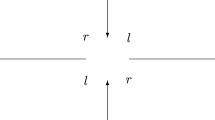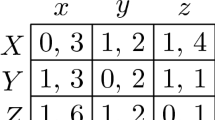Abstract
We offer a game-theoretic framework that enables the analysis of situations whereby rational individuals with different beliefs and views of the world agree to a shared course of action. We introduce a new solution concept: a mutually acceptable course of action, which can be viewed as an (incomplete) contract or a social norm that free rational individuals would be willing to follow for their own diverse reasons. We show that by varying the degree of completeness of the underlying course of action, our concept can be related to commonly used solutions, such as perfect equilibrium, perfect Bayesian equilibrium, (rationalizable) self-confirming equilibrium, and rationalizable outcomes.
Similar content being viewed by others
References
Akutagawa, R.: Rashomon and Other Stories. Liveright Publishing Corporation (1952)
Alos-Ferrer C. and Ritzberger K. (2005). Trees and decisions. Econ Theory 25: 763–798
Asheim G. and Perea A. (2005). Sequential and quasi-perfect rationalizability in extensive games. Games Econ Behav 53: 15–42
Aumann R. and Brandenburger A. (1995). Epistemic conditions for Nash equilibrium. Econometrica 63: 1161–1180
Battigalli P. and Siniscalchi M. (1999). Hierarchies of conditional beliefs and interactive epistemology in dynamic games. J Econ Theory 88: 188–230
Bennett P.G. and Dando M. (1979). Complex strategic analysis: a hypergame study of the fall of France. J Oper Res Soc 30: 23–32
Bernheim D. (1984). Rationalizable strategic behavior. Econometrica 52: 1007–1028
Bernheim D. and Whinston M. (1998). Incomplete contracts and strategic ambiguity. Am Econ Rev 88: 902–932
Canetti, E.: Auto-Da-Fe. Stein and Day (1946)
Crawford V.P. (2003). Lying for strategic advantage: rational and boundedly rational misrepresentation of intentions. Am Econ Rev 93: 133–149
Dekel E. and Fudenberg D. (1990). Rational behavior with payoff uncertainty. J Econ Theory 52: 243–267
Dekel E., Fudenberg D. and Levine D. (1999). Payoff information and self-confirming equilibrium. J Econ Theory 89: 165–185
Dekel E., Fudenberg D. and Levine D. (2002). Subjective uncertainty over behavior strategies: a correction. J Econ Theory 104: 473–478
Feinberg Y. (2005a). Subjective reasoning—dynamic games. Games Econ Behav 52: 54–93
Feinberg Y. (2005b). Subjective reasoning—solutions. Games Econ Behav 52: 94–132
Fudenberg D. and Kreps D. (1995). Learning in extensive games I: self-confirming equilibria. Games Econ Behav 8: 20–55
Fudenberg D. and Levine D. (1993). Self-confirming equilibrium. Econometrica 61: 523–546
Fudenberg D. and Tirole J. (1991). Perfect Bayesian and sequential equilibrium. J Econ Theory 53: 236–260
Greenberg I. (1982). The role of deception in decision theory. J Conflict Resolut 26: 139–156
Greenberg J. (2000). The right to remain silent. Theory Decis 48: 193–204
Greenberg J., Monderer D. and Shitovitz B. (1996). Multistage situations. Econometrica 64: 1415–1437
Grossman S. and Hart O. (1986). The costs and benefits of ownership: a theory of vertical and lateral integration. J Political Econ 94: 691–719
Harsanyi, J.: Games of incomplete information played by Bayesian players, parts I–III. Manage Sci 14, 159–182, 320–334, 486–502 (1967–68)
Hart O. and Moore J. (1988). Incomplete contracts and renegotiation. Econometrica 56: 755–785
Hendricks K. and McAfee R.P. (2006). Feints. J Econ Manage Strategy 15: 431–456
Hipel K.W., Wang M.H. and Fraser N.M. (1988). Hypergame analysis of the Falkland/Malvinas conflict. Int Studies Quart 32: 335–358
Huang S.-C. and Luo X. (2008). Stability, sequential rationality, and subgame consistency. Econ Theory 34: 309–329
Kalai E. and Lehrer E. (1993). Rational learning leads to Nash equilibrium. Econometrica 61: 1019–1045
Kreps D. (1990). Game Theory and Economic Modelling. Oxford University Press, Oxford
Kreps D. and Wilson R. (1982). Sequential equilibria. Econometrica 50: 863–894
Kuhn H.W.: Extensive games and the problem of information. In: Kuhn, H.W., Tucker, A.W. (eds.) Contributions to the Theory of Games, vol. II, pp. 193–216. New York, NJ: Princeton University Press (1953)
MacMillan, M.: Paris 1919: Six Months that Changed the world. Random House (2002)
Osborne M.J. and Rubinstein A. (1994). A Course in Game Theory. The MIT Press, Cambridge, MA
Pearce D. (1984). Rationalizable strategic behavior and the problem of perfection. Econometrica 52: 1029–1050
Rubinstein A. (1991). Comments on the interpretation of game theory. Econometrica 59: 909–924
Rubinstein A. and Wolinsky A. (1994). Rationalizable conjectural equilibrium: between Nash and rationalizability. Games Econ Behav 6: 299–311
Said A.K. and Hartley D.A. (1982). A hypergame approach to crisis decision-making: the 1973 Middle East War. J Oper Res Soc 33: 937–948
Selten R. (1975). Reexamination of the perfectness concept for equilibrium points in extensive games. Int J Game Theory 4: 25–55
Shupe M.C., Wright W.M., Hipel K.W. and Fraser N.M. (1980). Nationalization of the Suez Canal: a hypergame analysis. J Conflict Resolut 24: 477–493
Squintani F. (2006). Mistaken self-perception and equilibrium. Econ Theory 27: 615–641
von Neumann J. and Morgenstern O. (1944). Theory of games and economic behavior. Princeton University Press, New Jersey
Wang M.H., Hipel K.W. and Fraser N.M. (1988). Resolving environmental conflicts having misperceptions. J Environ Manage 27: 163–178
Williamson, O.: The Economic Institutions of Capitalism. The Free Press (1985)
Author information
Authors and Affiliations
Corresponding author
Additional information
We are grateful to the editor and an anonymous referee for very useful and helpful comments and suggestions. Earlier versions of this paper were circulated under the title “Towering over Babel: Worlds Apart but Acting Together”. We thank participants at the World Congress of Game Theory Society (2004), the International Conference on Game Theory (2004), the European Meeting (2004), and the Econometric Society World Congress (2005). Financial support from SSHRC and NSERC of Canada, and the National Science Council of Taiwan are gratefully acknowledged.
Rights and permissions
About this article
Cite this article
Greenberg, J., Gupta, S. & Luo, X. Mutually acceptable courses of action. Econ Theory 40, 91–112 (2009). https://doi.org/10.1007/s00199-008-0349-5
Received:
Accepted:
Published:
Issue Date:
DOI: https://doi.org/10.1007/s00199-008-0349-5
Keywords
- Extensive games
- Perfection
- Course of action
- Self-confirming equilibrium
- Rationalizability
- Strategic contracts




